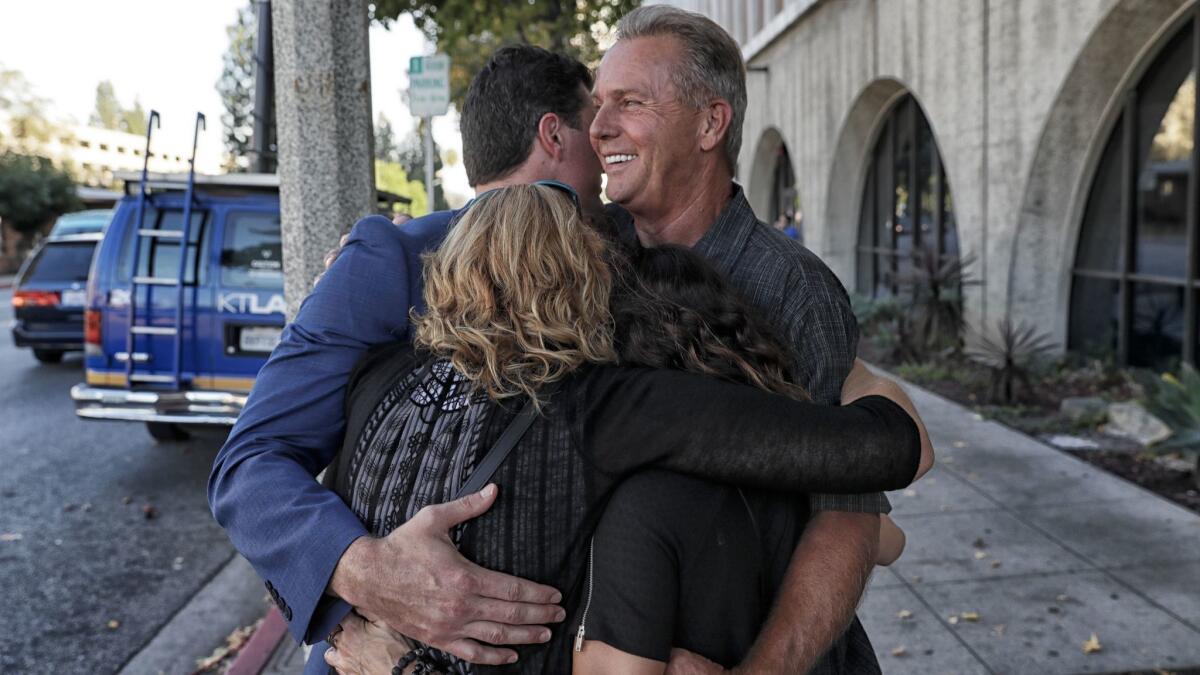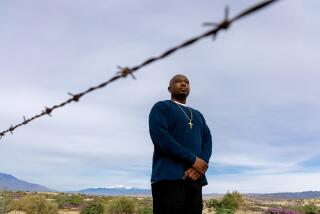L.A. County to pay $15 million to man wrongfully convicted of murder

- Share via
After nearly three decades of legal battles, Frank O’Connell finally got the news he says will help him move on with his life.
He had spent 27 years behind bars for a murder he insists he did not commit. He had missed precious moments he could never relive, particularly the growth of his 4-year-old son into adulthood.
But on Tuesday, the final chapter in O’Connell’s legal odyssey closed as the Los Angeles County Board of Supervisors approved a $15-million settlement in his civil rights lawsuit against the Sheriff’s Department.
Surrounded by family and his legal team, O’Connell stood outside the same Pasadena courthouse where a judge convicted him 32 years ago of fatally shooting a man at a South Pasadena apartment complex.
“This is a bittersweet moment for me,” O’Connell said standing next to his son, Nick. “I can now try to put the past behind me, but I can never forget what happened to me during those years I was in prison.”
His 80-year-old mother, RoseMarie O’Connell, broke down in tears.
“This is the happiest moment of my life. Every time I used to pass by this courthouse, it brought back bad memories,” she said.
The settlement is one of the largest in L.A. County in recent years, according to O’Connell’s attorney.
A judge freed O’Connell in 2012 after finding that sheriff’s detectives failed to disclose exculpatory evidence during his original trial.
Since 1989, at least 180 people have had wrongful convictions thrown out in California, including 63 in Los Angeles County, according to data from the University of Michigan’s National Registry of Exonerations. A majority of the Los Angeles cases involved witness misidentification.
O’Connell’s conviction rested heavily on the testimony of a stranger who witnessed the killing and identified him in court as the gunman.
This year alone, Los Angeles County courts have declared wrongful convictions in four cases, according to the registry. Among the defendants were Raymond Lee Jennings, Marco Contreras and Michelle Poulos — all three of whom were declared factually innocent in court.
On Jan. 5 1984, O’Connell was arrested in the shooting death of Jay French, a maintenance worker who had been in a heated custody battle with his ex-wife over their son.
O’Connell was a 27-year-old woodworker at the time. The Sheriff’s Department suspected him early on.
French’s ex-wife — Jeanne Lyon — told detectives that O’Connell had moved in with her and that they had a brief affair. In addition, a witness to the shooting reported to detectives that French told him after he was shot that “this had something to do” with his ex-wife, according to court documents.
O’Connell matched the description from witnesses of a tall, slender, blond gunman. The prosecution’s star witness was Daniel Druecker, a tenant in the State Street apartment complex where the shooting occurred. Druecker identified O’Connell as the gunman from a photo lineup and testified that he was sure O’Connell was the killer.
A year after the shooting, O’Connell, a former football star at Glendora High School, was convicted of murder and sentenced to 25 years to life in prison.
For the next 27 years while in prison, he maintained his innocence. He wrote to Centurion Ministries, a nonprofit organization that works on behalf of inmates who claim they were wrongfully convicted, and asked for help.
“I quickly realized this was an innocent man,” said Kate Germond, executive director at Centurion, who worked on O’Connell’s case.
Germond learned that Druecker had an obstructed view of the shooting and wasn’t wearing his glasses at the time. Druecker also told Germond that he felt pressured by detectives to identify O’Connell as the gunman.
I’m a little disappointed I never got an apology and I realize it may never happen, but I don’t carry it with me.
— Frank O’Connell, who will receive $15 million in his lawsuit claiming he was wrongfully convicted of murder
At a new hearing in 2012, a judge determined O’Connell should be freed. Detectives, she ruled, may have improperly influenced witnesses and failed to give the defense evidence pointing to another possible suspect, a violation of the so-called Brady rule, which requires the government to turn over favorable evidence to the defense.
The evidence that was suppressed included an anonymous tip from a caller who claimed French’s ex-wife had paid a hit man in Oregon $7,000 to kill her husband, according to court documents.
In her ruling, L.A. County Superior Court Judge Suzette Clover faulted detectives for not turning over notes from their investigation revealing that another boyfriend of Lyon was suspected of trying to kill her husband several years earlier. That man was described as tall with sandy or blond hair.
After O’Connell was freed, sheriff’s detectives asked the district attorney’s office to refile murder charges against him, but prosecutors declined.
In 2013, O’Connell filed a federal civil rights lawsuit against the Sheriff’s Department alleging that detectives withheld evidence and provided misleading information during his trial.
Attorneys for the sheriff’s detectives argued that the law was unclear at the time about what evidence police needed to turn over to defendants.
In 2015, a federal appeals panel said authorities should have known that they were required to give O’Connell the evidence. O’Connell’s attorney, Ronald Kaye, said he hopes the case will prompt the Sheriff’s Department to make sure that detectives provide defendants with evidence that ensures a fair trial. “You have an obligation to provide evidence that is favorable to the defense,” Kaye said.
The case remains an open murder investigation, and prosecutors have not charged anyone else since O’Connell was released.
The Sheriff’s Department said in a statement that as a result of the case, the agency had “developed a checklist which will ensure that there is documentation reflecting that all material evidence has been turned over to prosecutors.”
O’Connell, now 59, works at an auto repair shop in Colorado. He’s spent the last five years rebuilding his relationship with his son.
He said he has enjoyed relearning the simple things since being released from prison, such as how to drive and use new technology.
“It’s been exciting and yet scary at the same time. But every day I wake up on my feet and I don’t look back,” O’Connell said.
He said he hopes the settlement will be a catalyst for change at the Sheriff’s Department to prevent wrongful convictions in the future.
Maintaining a positive attitude, he says, is the only way he can move forward in life.
“I’m a little disappointed I never got an apology, and I realize it may never happen, but I don’t carry it with me,” O’Connell said.
Follow me on Twitter @melissaetehad
UPDATES:
7:00 p.m.: This article was updated with additional comments from O’Connell as well as comments from his mother and the Sheriff’s Department.
This article was originally published at 2:25 p.m.
More to Read
Sign up for Essential California
The most important California stories and recommendations in your inbox every morning.
You may occasionally receive promotional content from the Los Angeles Times.











